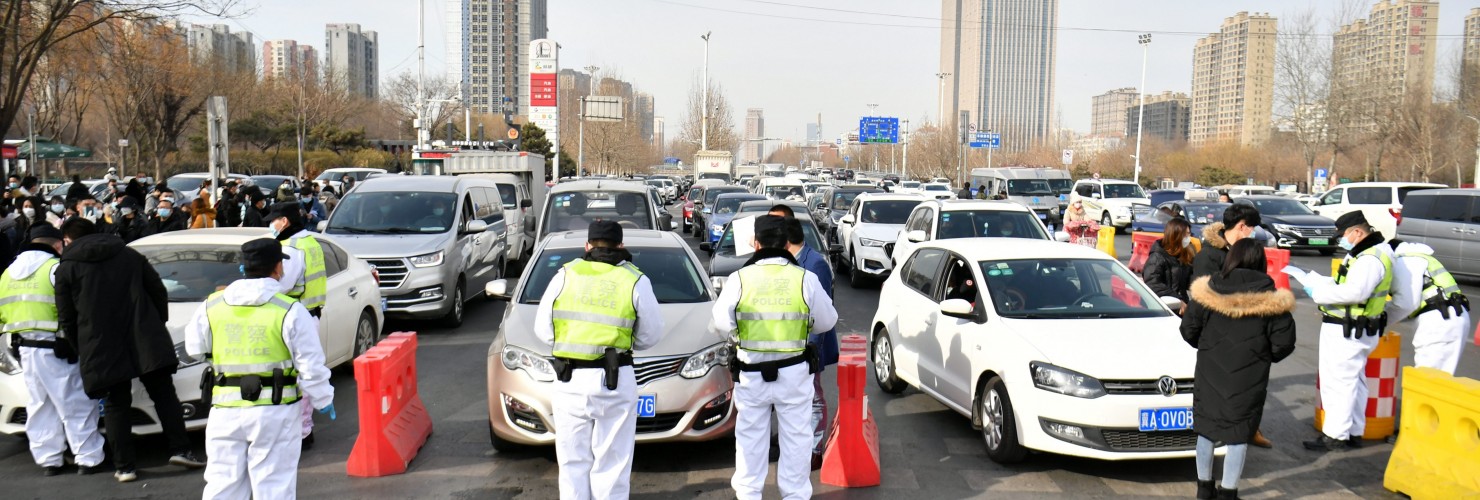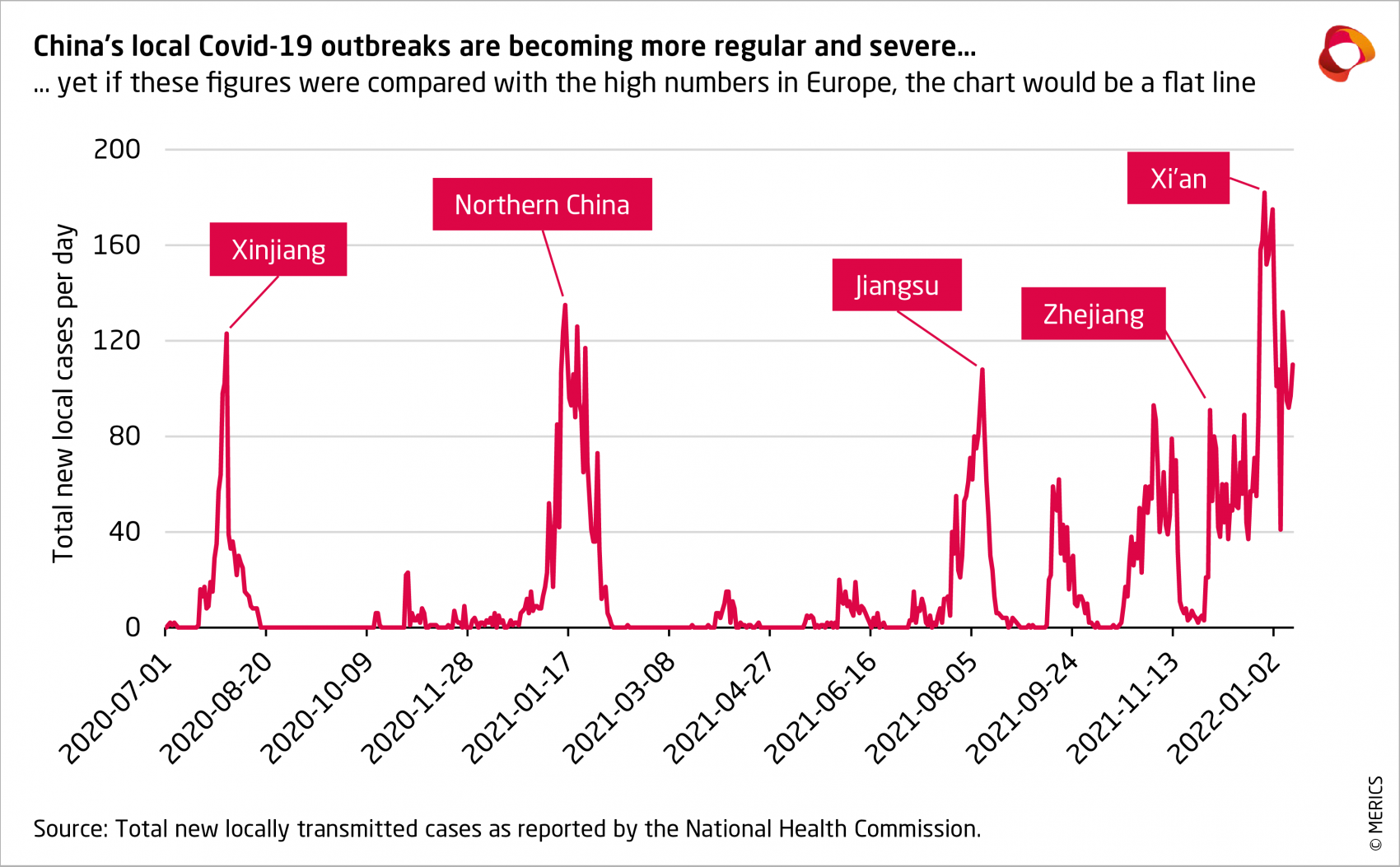

China's dynamic zero strategy + Kazakhstan + Algorithm rules
Top Story
China’s dynamic zero strategy faces test with Omicron as Olympics loom
The lockdown of China’s megacity Xi’an enters its third week after daily Covid 19 cases in China hit 235 on New Year’s Eve, a record-high since March 2020. The authorities stepped in with a heavy hand to contain the outbreak, forbidding many citizens from going out of their houses altogether.
Earlier in 2021, Chinese authorities had already adapted their “zero covid” strategy to “dynamic zero” as a result of difficulties containing the Delta strain of the coronavirus. The goal now is no longer to maintain zero cases at all times, but to extinguish new clusters as quickly as possible.
But this policy has side effects: many citizens were unable to buy food due to tight restrictions. One woman suffered a miscarriage at a hospital’s gates when she was refused entry because her test had exceeded the four-hour timeframe. Though cases are now on the retreat, citizens have voiced heavy criticism online of the approach taken in Xi’an.
And despite these tough measures, scattered outbreaks continue to occur across China, following each other with ever more speed as the virus becomes increasingly difficult to contain. Other cities including Xuchang, Zhengzhou, and Ningbo now face new measures or local lockdowns. The upcoming Spring Festival, which starts on February 1, is likely to add further concerns as traditionally this is when workers return home to their families, creating the world’s largest human migration.
The restrictions will also seriously impact consumption and growth. Xi’an is a major inland economic hub, which means supply chains that run through the city will cause problems for downstream customers across China. The megacity Tianjin, which last weekend reported the first domestically-transmitted Omicron cases, is only half an hour away by train from the capital with frequent commuter traffic. Restrictions in Tianjin and Ningbo, the world’s ninth and third busiest ports, respectively, will further rattle the already precarious situation of global supply chains.
If Omicron continues to spread to other regions, the economic impact could be severe. Unpredictable rolling lockdowns will potentially strangle supply chains and seriously impact consumption, especially in services. This will create a further impediment to China’s push to expand consumption and rely less on exports as a driver of growth.
MERICS analysis: “China’s authorities are confident that its refined strategy will be able to beat Omicron, just as it has rather successfully done with other variants. On balance, dynamic zero is still the best choice for China compared with the high case numbers and loss of life throughout Europe. Yet, for China the social and economic costs of maintaining its strategy are constantly increasing. The timing of the outbreak in Tianjin must also have Beijing concerned. Any major outbreaks in the capital would certainly take away the shine surrounding the approaching Olympics,” says MERICS Analyst Vincent Brussee.
Media coverage and sources:
- WhatsonWeibo: China and Covid19 Xi’an Outbreak Largely Under Control, But Weibo is Grieving the Death of an Unborn Baby
- China Digital Times: Lockdown voices: Pain, hunger, and a journalist determined to speak the truth in Xi’an
- Gavekal Dragonomics: Covid containment evolves
METRIX

The number of pro-democracy media outlets in Hong Kong that shut down during the days after Christmas. The prominent media organization Stand News was forced to cease operations after the police arrested several members of its senior staff and raided their office. In reaction to the arrests the news website Citizen News announced it would close down as well, explaining that it had to ensure the safety of its staff. The closures come against the backdrop of a new wave of government action to contain dissent and sanitize history in line with the CCP’s doctrine. Three memorials for the 1989 Tiananmen protests were removed overnight during the Christmas break, while several activists were charged with sedition or sentenced for organizing vigils. (Sources: BBC, Reuters, NPR, Reuters, BBC)
TOPICS
Protests in Kazakhstan – Russian intervention gets tacit approval from Beijing
The facts: For the second time in just a few months, Beijing is facing turmoil on its Western borders. Following the Taliban’s takeover of Afghanistan in August last year as western forces withdrew, now Kazakhstan has been swept by popular protests. Triggered by mounting fuel prices, the unrest has led to a violent military crackdown. Kazakh President Tokayev blames the violence on foreign-trained terrorists.
Beijing initially reacted by simply noting that this was an internal Kazakh matter and calling for order to be restored. But on January 7, President Xi threw China’s weight behind Tokayev, adopting the latter’s foreign interference narrative. Xi told his Kazakh counterpart that China opposes what he described as “external forces” instigating a “color revolution” in Kazakhstan and offered Beijing’s support to quell the unrest.
What to watch: Following a request from President Tokayev, Russia has sent troops to Kazakhstan to help maintain order through the Moscow-led Collective Security Treaty Organization (CSTO). China, on the other hand, is unlikely to get involved to that extent. Central Asia is an arena of potential tension between Moscow and Beijing, as China’s influence spreads in Russia’s traditional sphere of influence. However, Beijing’s reaction has shown that it is perfectly happy to let Moscow act as a security guarantor in the region, as long as China’s primary interest – stability – is protected. While the Beijing-led Shanghai Cooperation Organization (SCO) has pledged to intervene if requested, it has also expressed support for the Kazakh government’s actions, tacitly approving Russia’s intervention.
MERICS analysis: “While the Sino-Russian relationship is marred by a degree of distrust that is only growing as the balance of power between them tilts in China’s favor, Beijing’s reaction to the crisis in Kazakhstan and its willingness to accept – and even support –Russia’s involvement in the country shows the current strength of the relationship,” says Helena Legarda, MERICS Lead Analyst. “Despite the obvious differences between the two cases, lessons can be drawn with regards to the likelihood that China would support, at least diplomatically, a potential Russian invasion of Ukraine.”
Media coverage and sources:
China’s new algorithm rules break regulatory ground globally
The facts: China has taken a major step towards regulating algorithms. At the end of last year, the Cyberspace Administration of China (CAC) and three other ministries finalized and published rules to tighten authorities’ oversight of how tech companies use recommendation algorithms. This marks the world’s most ambitious attempt to date at regulating these technologies. Civil society and governments the world over worry about the influence that internet platforms can exert through the algorithms used to push content. The directive, announced on December 31, 2021, will enter into force on March 1.
What to watch: Consumer internet firms will be heavily impacted. Regulators are looking to give users – and the state – more control over how their data is fed into the computational sequences that provide personalized content and information online. This includes everything from what users read on Toutiao, Bytedance’s news aggregating app, to the products they buy on e-commerce sites like Alibaba’s Taobao. Service providers face a range of new requirements, including technical interventions allowing users to view and disable the keywords used to profile them. Abusive practices, such as using algorithms for price discrimination, or the creation and dissemination of fake news and deepfakes, will be banned.
MERICS analysis: “EU regulators should watch closely as China outruns them in experimenting with tricky areas of AI governance. These regulations – more than the much-hyped social credit system – reveal the subtle ways in which the CCP is extending its grip on society through technology. Recommendation algorithms can nudge public opinion and behavior, something Beijing clearly seeks to use the new provisions for. At the same time, there are elements EU regulators could take inspiration from. The concrete attempt to address the negative impact of automated decision-making on consumer welfare, social cohesion and workers’ rights could provide a standard for other large polities to build on,” says MERICS analyst, Rebecca Arcesati.
More on the topic:
- Lofty Principles, Conflicting Incentives: AI Ethics and Governance in China, China Monitor by Rebecca Arcesati
- Tech Regulation in China Brings Sweeping Changes, Short analysis and mapping by Kai von Carnap and Valarie Tan
Media coverage and sources:
- CAC (CN): Internet Information Service Algorithmic Recommendation Management Regulations (互联网信息服务算法推荐管理规定)
- Weixin (CN): Public announcement accompanying the regulations
- DigiChina: Translation of the regulations with comparison to earlier draft
- Rest of World: China steps up efforts to ban deepfakes. Will it work?
A not-so-happy New Year for China’s real estate developers
The facts: China’s real estate sector continued to struggle during the transition into 2022. The now-infamous Evergrande was formally declared to be in default, and the company’s headquarters in Shenzhen was relocated to a more affordable building in the city. Meanwhile, other players in the industry showed further signs of buckling under the pressure. Shimao, Kaisa, Fantasia, Sinic, Modern Land, and Agile, all developers, defaulted on loan payments amidst fire-sales of assets and projects in a desperate bid to raise funds to make their payments. The downturn has been so sharp that there is serious talk about delaying Beijing’s plans for property tax pilots.
What to watch: In response, China’s SOEs have intervened by purchasing assets to provide cash to ensure payments are made and have also taken over many of the ongoing projects to guarantee they are completed. This may help mitigate contagion risks, but it is doing little to push forward Beijing’s goal of deleveraging the economy. Instead of reducing debt and its associated risks overall, these moves simply shift the debt to more stable players in the economy, which either pay for it directly, reducing their assets, or take out loans from state-run banks to finance the purchase.
MERICS analysis: “The real estate crackdown is necessary, but will seriously drag down both growth and confidence,” says MERICS Senior Analyst, Jacob Gunter. “Economic stability is the key goal in the lead up to the 20th Party Congress, as outlined in the 2021 Central Economic Work Conference in December. We should anticipate that contagion risks will continue to be managed like this moving forward, but regulators may back off from the broader effort to deleverage if growth lags too much, as this may be viewed as a can that could be kicked down the road for one more year.”
Media coverage and sources:
REVIEW
Shields of the Republic: The Triumph and Peril of America’s Alliances, by Mira Rapp-Hooper (Harvard University Press, 2020)
This book is worth reading for anyone following the reorientation of American foreign policy towards meeting a more assertive China. Jake Sullivan, President Biden’s National Security Advisor has spoken about US goals for building a new partner “framework”, and Mira Rapp-Hooper is poised to contribute to this effort in her current role advising the US State Department Policy Planning team.
Former President Donald Trump was not alone in his view that the United States should rely less on friends when conducting foreign policy. Emboldened by his antipathy, more and more Americans were questioning why their country was devoting so much of its energy to supporting countries far away. The United States appeared to be falling out of love with alliance building.
Alarmed by this inward turn, Rapp-Hooper set out to recapture US excitement for its alliance system. The result of this effort is Shields of the Republic, a fast-paced analysis of American foreign policy past and present, focusing on one particular kind of partnership, mutual defense treaties.
It is hard to calculate the benefits of an alliance. To get around this problem, Rapp-Hooper engages in something called “counterfactual” analysis. This daring approach involves her imagining how particular historical moments might have unfolded if a treaty had not been in place. In doing so, she makes her case to a world-weary American public that the costs of alliances are worth it.
The trouble with mutual defense treaties is that many Chinese and Russian actions today involve grey zone activities such as cyber-attacks. They are below the activity that would invoke a treaty, thereby circumventing the arrangements of old. To address this point, Rapp-Hooper convincingly argues that US alliances erected during the Cold War should be retrofitted for the contemporary challenges rather than simply discarded.
Review by Michael Laha, German Chancellor Fellow
Media coverage and sources:
MERICS CHINA DIGEST
Sri Lanka's president asks China to restructure debt repayments (Reuters)
Sri Lanka's President asked Beijing for the restructuring of debt repayments as the country faces a worsening financial crisis. The South Asian country has received billions of dollars in loans from China which is its fourth biggest lender. (22/01/10)
Xinjiang anti-terror general to lead China’s Hong Kong garrison (The Guardian)
Peng Jingtang, A general who led China’s anti-terrorism special forces in Xinjiang, was appointed the new chief of the People’s Liberation Army’s garrison in Hong Kong. (22/01/10)
As Beijing takes control, Chinese tech companies lose jobs and hope (New York Times)
China’s ongoing crackdown on the tech sector is affecting the entrepreneurial drive and job opportunities in the industry. (22/01/05)
Shanghai doubles down on the metaverse by including it in a development plan (CNBC)
Shanghai has reportedly been the first Chinese city to include the metaverse in its new five-year development plan. The document encourages metaverse use in public services, business offices and other areas. (21/12/31)
